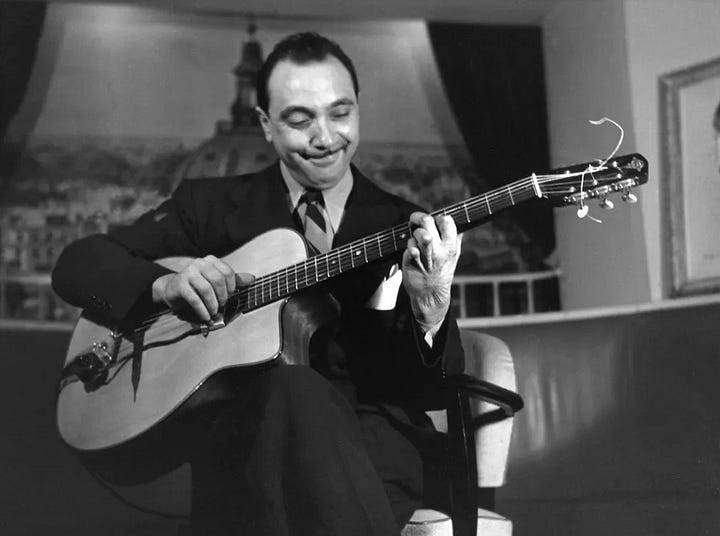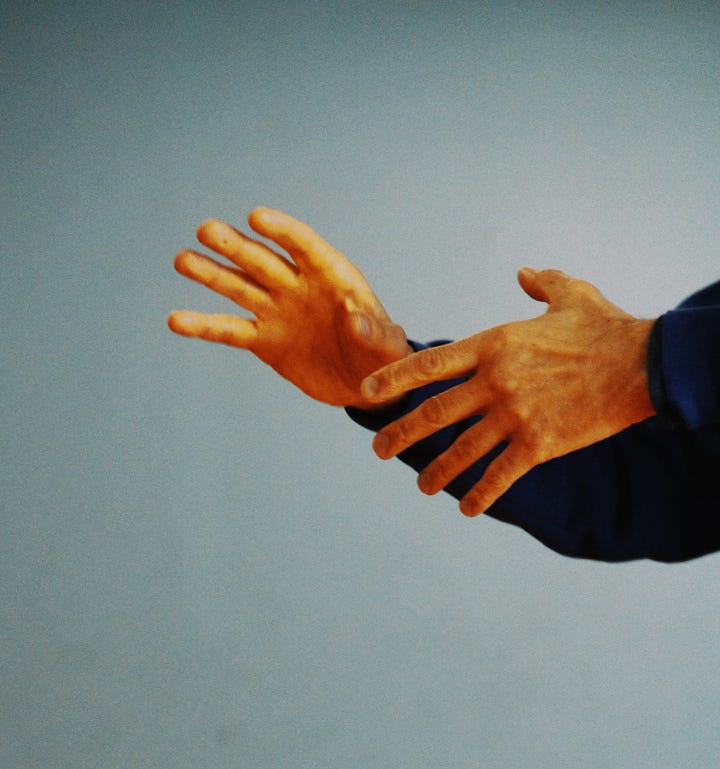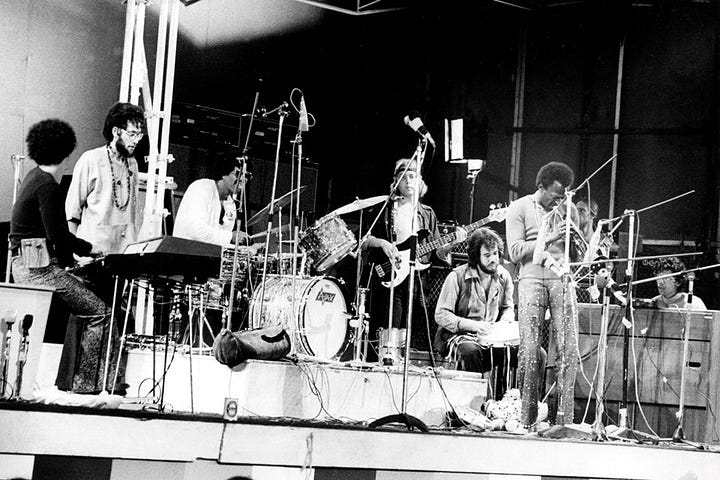



'The week begins and ends with music.' On Mondays and Fridays, a music video appears under Notes. And midweek a video or article on 'thinkers and doers'. This material comes from what I came across and collected over the years in research for lessons and training, later in developing a museum and now in preparing to write articles.
Unlike the publication of a new post, you will not receive an automatic e-mail announcement of these 'musical notes' and 'thinkers and doers notes'. The Notes can be found on the TREE TIME homepage, as a button in the menu bar at the top of the screen.
You wonder what music has to do on a chi kung platform?
During my high school days, the content of the lessons we were offered largely passed me by. My life revolved around music. One fine day, a friend had played a tune on his guitar, and I was immediately sold. I got a guitar and joined a teacher living nearby on a weekly basis. And what a teacher it was. A seasoned jazz man who instilled in me a love of Django Reinhardt's playing. And that of Joe Pass and Wes Montgomery and the other guitar heroes. While my classmates were listening to Abba and Pink Floyd, I was trying to play jazzy chords and riffs my own. Not that I was overly talented, but music nevertheless filled my teenage years.
In those years, attempts were being made in The Hague, my home town, to pull jazz out of the doldrums. Every Sunday, a concert was organised in a tiny theatre in the city centre of The Hague. Together with my best music friend, I made sure to be there as often as possible. We knew someone in the organisation, who invariably matched us inside and made sure we could sit in the wings at the back of the stage. As young fellows, we looked up to Billy Higgins' back and saw his feet playing the hi-hat and bass drum. We saw and heard up close Dexter Gordon and Ack van Rooyen and guitarists like Wim Overgauw and Joop Scholten. 'Jazz in Pepijn' would partly form the basis of North Sea Jazz, where we could also sneak in for the first few editions.
We formed a band, which had varying line-ups, and while classmates had weekend jobs, we filled the time with rehearsals and performing regularly on Saturday nights in music bars or clubs. No pop music for us, but Miles Davis, Jaco Pastorius and Tony Williams.
An even deeper connection with music grew. I must have been eighteen, participating in weekly rehearsals of the Indonesian embassy's gamelan orchestra. My ears found little grip and structure in this musical culture, and precisely because of this, it unfiltered did its job and came in. Later, when I moved to Amsterdam, I joined Ernst Heins' gamelan group for a period. Playing the mid-Javan gamelan in the evening in a quiet and sparsely lit Tropen Institute or Asian department of the Rijksmuseum was an unforgettable experience.
While several of my music friends, who did have the talent in abundance, pursued their path in the music world, I dropped out step by step. After quite a few wanderings, I found my niche. I studied shiatsu, Chinese and Japanese acupuncture and qualified in martial disciplines and chi kung. I had turned left at a crossroads, while music, had I continued with it, would have taken me on a path to the right. Listening to music remained my best daily habit, as did attending concerts at Amsterdam's Bimhuis and elsewhere. But music and chi kung practice were two separate worlds. That's just how it works in a society where all things are strictly defined, delineated and thus lose their interconnectedness. Nevertheless, I did find rhythm and timbre, melody and interplay in chi kung. Even more than I had ever been able to experience during my music years.
All this led me to find employment in a previously non-existent profession, that of chi kung instructor. It brought me into contact with people from the most diverse backgrounds and I was able to teach in several European countries. Over the years, I also regularly received invitations to teach within conservatoires and my classes attracted many singers and instrumentalists. The worlds of music and body control and self-defence thus steadily approached each other again.
The last years of my career as an instructor took me to Germany. I was asked to give clinics within an organisation where many medics and paramedics were affiliated. The initiator of this organisation, Chinese physician Jiao Guo-Rui, who died in 1997, had called his style of approach 'yang shen gong', a classical Chinese term translated as 'nourishing life'. Professor Jiao had been in close contact with grandmaster Wang Xiang-Zhai. In the last years of his life, he had been his personal physician as well as a student. I in turn had studied Wang Xiang-Zhai's tradition and style, the I Chuan, for the twenty-five years.
So now I brought my chi kung experience to the German cities I was invited to, and let myself be freely influenced by the liberal and liberating thought of 'yang shen gong'. 'Nourishing life' is by no means limited by the practice of circumscribed Chinese exercises. It includes good conversation, the daily stroll, cooking for others, writing a poem or story, or reading, and of course making or listening to music.
Fifty years have passed since the Sundays when we sat backstage watching and listening in wonder to Han Bennink and Rob Agerbeek. That's how long it took me to finally realise separating things doesn't make life any better. Chi kung cannot be done without music any more than making music without a body.
Therefore, on a platform for chi kung, I make the week start and end with music.
How the week began on Monday, June 30, with ...
And how the week ended on Friday, July 4, with ...

